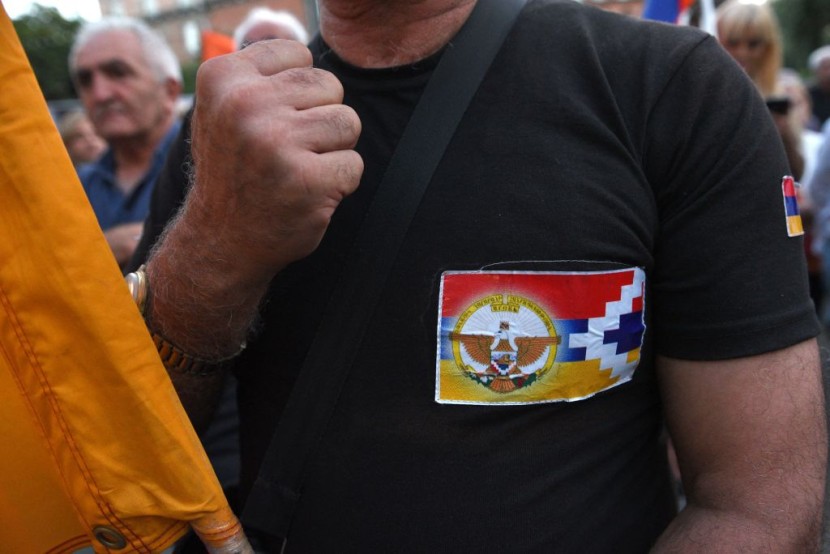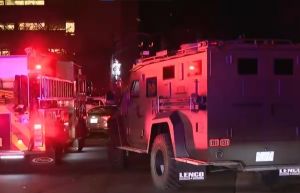
Ethnic Armenian separatists in Nagorno-Karabakh have surrendered and agreed to a ceasefire Wednesday (September 20), 24 hours after authorities in Azerbaijan launched an offensive to restore full control of its territory.
The agreement, confirmed by both Stepanakert and Baku and effective 13:00 local time (09:00 UTC) Wednesday, stipulated the disbanding and disarmament of Armenian separatists and the continuation of talks regarding the future of the region, which Armenians call "Artsakh," beginning the next day (Thursday, September 21).
However, the Armenians of Nagorno-Karabakh said they have been forced to agree to Azerbaijan's terms, which were carried through by Russian peacekeepers after Azeri troops seized a number of strategic locations without any international intervention.
"The authorities of the Republic of Artsakh accept the proposal from the command of the Russian peacekeeping contingent to cease fire," the ethnic Armenian government of the flashpoint region said in a statement as quoted by Reuters.
Nevertheless, fighting in the region, especially in the Karabakh capital of Stepanakert, has died down.
The fighting re-ignited in the region Tuesday (September 19) after officials in Baku said they were forced to resort to military action after an alleged series of provocations which culminated in the alleged murder of some Azeri soldiers by what they claimed were ethnic Armenian separatists from the area.
What Does the Ceasefire Mean to Armenians in Nagorno-Karabakh?
The outcome would appear to pave the way for Baku to integrate around 120,000 ethnic Armenians into its society, which some Armenians say was their worst fear.
Meanwhile, Armenia denied it had military forces in Karabakh despite Azerbaijani assertions, and did not intervene militarily as a result. Officials in Yerevan have accused their Baku counterparts of trying to ethnically cleanse Karabakh of Armenians, something Azeris denied in return.
With the ceasefire taking effect, there are speculations on how many ethnic Armenians would stay in Nagorno-Karabakh and how many would leave for Armenia, where they would probably be embraced as fellow countrymen by fellow Armenians.
Despite Azerbaijan's tactical victory, it faced sharp criticism from the US and other European countries due to the military operation resulting in the deaths of dozens and the injury of hundreds of Armenians. Western officials, in particular, said the Nagorno-Karabakh conflict should have been solved through diplomatic discussions and should not have resulted in bloodshed, which worsened the already dire humanitarian situation on the ground.
Read Also : Azerbaijan Allows Supplies, Aid Into Armenia's Nagorno-Karabakh Region After 9-Month Blockade
Old Wounds Run Deep
Armenia and Azerbaijan, and their peoples, have been perpetually in enmity with each other ever since the dawn of organized religion in the Caucasus.
Armenians have been traditionally Christian and happened to be the first nation to ever establish Christianity, particularly the Armenian Apostolic Church, as its state religion - which happened in 301 AD. On the other hand, Azeris are predominantly Muslim, much like their other Turkic cousins.
Due to ethnic roots and religious similarities, Azerbaijan is a close ally of Turkey to this day and was partially responsible for the Armenian Genocide during the First World War, which spilled over into a war with independent Armenia from 1918 to 1921.
Aside from religion, being under the Russian sphere of influence also contributed to the conflict between the two nations, as they both became part of the Russian Empire and later, the Soviet Union. Upon the Soviet collapse beginning in the 1980s, both countries re-established their own republics and fought a bloody six-year war from 1988 to 1994 for Nagorno-Karabakh, which had a repeat back in 2020. In both wars, several places in Nagorno-Karabakh changed hands multiple times.
Since then, tensions have escalated. It was especially felt after Azeri troops blockaded the Lachin Corridor, the only way in and out of the Armenian enclave after the territorial changes of the 2020 war.
Moreover, Armenia felt Russia abandoned them due mostly to Moscow's invasion of Ukraine, which the Azeris took as an opportunity to take control of the Armenian enclave once and for all. This resulted in Armenian Prime Minister Nikol Pashinyan seeking US assistance when it came to honing Armenia's defense capabilities.
© 2025 HNGN, All rights reserved. Do not reproduce without permission.








